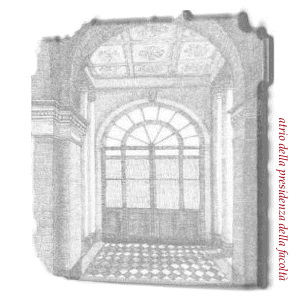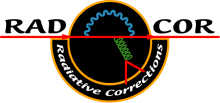


Phenomenology of Fundamental Interactions
The
Graduate School in Physics of
Torino University
organizes different Ph.D. Programmes in Theoretical Physics that are related
to the research lines pursued within the
Department of Theoretical Physics and the
INFN Sezione di Torino
and are linked to international collaborations both at the scientific and
teaching level.
Phenomenology of Fundamental Interactions consists of two
distinct Ph.D Programmes
- Physics at Colliders
- Astroparticle and neutrino Physics
The different curricula are activated on a yearly basis (November-May)
depending on the profile of the selected Ph.D. students.
The courses are by default in English.
Ph.D. Programmes on Phenomenology of Fundamental
Interactions
 We invite external Ph.D. students, in particular from neighboring
universities, to participate in our Programmes that are activated
on a yearly basis as advertised on the net.
We invite external Ph.D. students, in particular from neighboring
universities, to participate in our Programmes that are activated
on a yearly basis as advertised on the net.
The detailed plan of the introductory courses will depend on the profile
of the students. These are assumed to have followed at least three preliminar
courses during their training, equivalent to the following three given at
Torino University:
-
Introduction to QFT (50 hours)
(G.Passarino)
-
Introduction to Renormalization (40 hours)
(G.Passarino/R.Pittau)
-
Phenomenology of Fundamental Interactions (50 hours)
(A.Bottino/
N.Fornengo)
Students who do not have these courses in their previous training will have
to take them during their Ph.D programme.
The remaining parts of the detailed plans of study for the two
Ph.D. Programmes are as follows:
Physics at Colliders
|
Ph.D. students that have an interest in this field will have to follow
a teaching path composed by:
- An introductory course belonging to the Laurea Programme
- 4 cycles of lectures on advanced topics
Introductory course on Radiative Corrections (40 hours)
G.Passarino/R.Pittau

- A short summary on:
- renormalization of the MSM, including QCD
- renormalization schemes
- anomalies in QFT
- Phenomenology of gauge theories in Born approximation and at
one loop
- QCD and quark-quark scattering
- Introduction to factorization
- Parton Model and QCD
- Deep inelastic scattering
- Drell-Yan cross-section
- Electron-positron to hadrons
- Introduction to infrared divergences:
- Cross-sections with photons
- One loop radiative corrections in QED and QCD
- Bremsstrahlung
- Introduction to KLN theorem and to YFS formalism
Depending on the audience the review on the MSM Lagrangian and renormalization
will be expanded.
Advanced lectures on: Introduction to QCD (30 hours)
V.del Duca/L.Magnea
- Constituent quarks
- DIS and the parton model (also with neutrinos, and application to
Drell-Yan)
- Review: One-loop renormalization, renormalization group and running
coupling
- Infrared and collinear divergences in massless QFT,
KLN theorem
- Exponentiation of IR divergences in QED
- Weizsacker-Williams approximation
- Re-summation of collinear logarithms for electrons
- IR safe observables: R ratio, SW jets, event shape variables
- Factorization hypothesis with application to DIS, DY, jet and
heavy quark production
- Parton distributions and fragmentation functions
- Altarelli-Parisi evolution I: from factorization, a' la
Weizsacker-Williams
- OPE and factorization for DIS
- Altarelli-Parisi evolution II: from OPE
- Gauge symmetry and Wilson loop
- Chiral symmetry breaking:
- pions, Goldstone bosons
- linear sigma-model
- effective Lagrangians
Advanced lectures on: Selected Topics in QCD (30 hours)
V.del Duca/L.Magnea
- Modern techniques for the calculation of QCD amplitudes:
- color decomposition
- helicity amplitudes ...
- Steps towards factorization theorems: eikonal approximation; formal
definition of parton distributions
- Altarelli-Parisi evolution III: as RG equation
- Introduction to two-scale problems and re-summation:
- small x: LO BFKL
- large x: re-summation from factorization (DY)
- Tools for phenomenology: jet algorithms, pdf fits, gallery of relevant
processes and cross sections
Advanced lectures on: Monte Carlo Computations in High Energy Physics
(30 hours)
A. Ballestrero
- Relevance and use of MC computations, Phenomenology - Simulation -
Analysis
- Different types of theoretical predictions, Analytical and
Semi-analytical MC
- Matrix elements: exact ME and approximations (as in Pythia, Herwig,
etc.)
- Applications for helicity amplitudes
- Automatic recursive calculations
- Phase spaces Invariants. Sequential approach
- Integration and generation techniques: adaptive, multi-channel,
one-shot
- Parton- shower for QED and QCD
- Applications:
- structure functions and YFS approaches
- parton distributions in QCD
- hadronization and jets
- slicing and subtraction methods, dipole formalism in
QCD and QED
Advanced lectures on: Spin in high energy physics (25 hours)
M.Anselmino
- Helicity and helicity conservation in fundamental interactions
- Polarized lepton-nucleon deep inelastic scattering and
polarized structure functions; neutral and charged currents. Sum rules
- Polarized structure functions in QCD parton model
- Experimental measurements of g1 and g2; tests of sum rules
- Transverse spin and measurements of transversal distributions
- Fragmentation properties of polarized quarks
- Flavour and spin decomposition of distribution and fragmentation
functions in semi-inclusive polarized deep inelastic scattering
- Spin effects in inclusive nucleon-nucleon processes;
factorization theorem in polarized case
- Spin asymmetries in inclusive hadronic interactions
- Spin effects in exclusive reactions and decays
[Top]

Astroparticle and Neutrino Physics
|
Ph.D. students will have to follow a teaching path composed of:
-
Astroparticle Physics (50 hours)
(A.Bottino
/A.Ferrari)
- Particles
in Cosmology and Astrophysics
(50 hours)
(A. Bottino/
N. Fornengo)
- Neutrino Physics
(30 hours)
(C.Giunti)
For students interested in topics of nuclear physics related to astroparticle
physics,
the following course will also be available:
Nuclear Topics in
Astroparticle Physics (30 hours)
(A. Molinari/W.M. Alberico)

[Back to main page]

![]()
![]()

 We invite external Ph.D. students, in particular from neighboring
universities, to participate in our Programmes that are activated
on a yearly basis as advertised on the net.
We invite external Ph.D. students, in particular from neighboring
universities, to participate in our Programmes that are activated
on a yearly basis as advertised on the net.

![]()
![]()